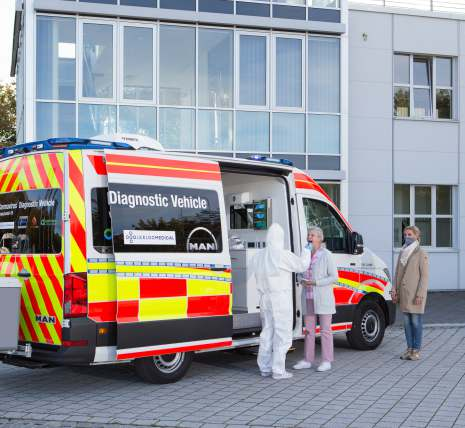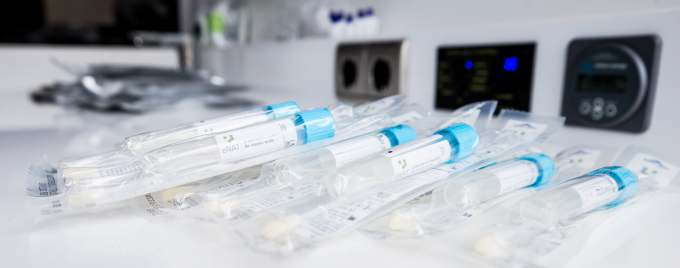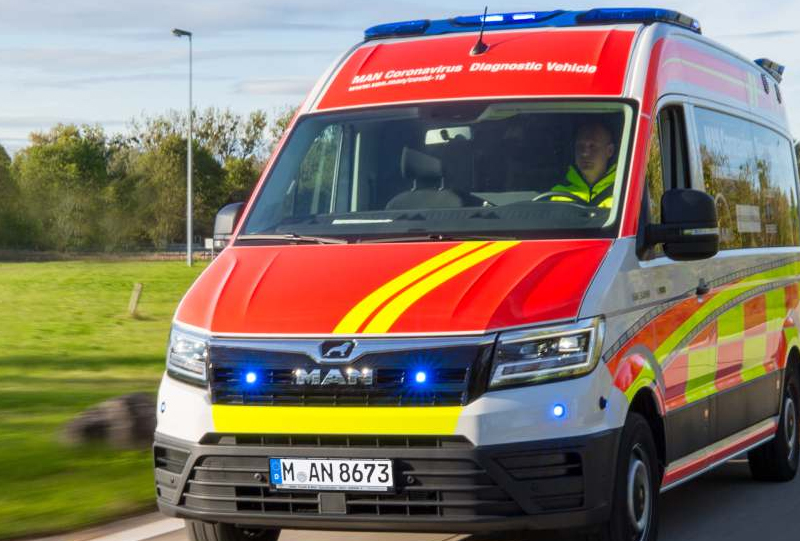MAN Truck Bus diversifies to mobile coronavirus test vehicle
The rolling laboratory van can do PCR tests with results available within an hour and is suited for deployment in hotspots, old people’s homes, schools, companies and other institutions, to help prevent the spread of COVID-19 virus.
 Collaborating with health experts, MAN Truck & Bus recently unveiled its innovative diagnostic vehicle that can be used to detect COVID-19 infections safely and quickly at hotspots and other places where it can easily spread.
Collaborating with health experts, MAN Truck & Bus recently unveiled its innovative diagnostic vehicle that can be used to detect COVID-19 infections safely and quickly at hotspots and other places where it can easily spread.
The company said the rolling laboratory vehicle is based on the MAN TGE van. It is equipped with the innovative molecular diagnostic PCR test equipment Vivalytic from Bosch Healthcare Solutions.
These PCR test devices are currently among the fastest approved devices on the market. The entire process including smear, sample preparation and testing takes less than an hour.
Man Truck & Bus says with more than 500 tests per vehicle and day, the rolling laboratory is perfectly suited for carrying out tests directly on site if a potential infection is suspected, for example in old people’s homes, schools, companies or other institutions. With the help of the MAN Coronavirus diagnostic vehicle, chains of infection can, thus, be interrupted in a targeted manner.
“The innovative MAN coronavirus test vehicle will make a vital contribution to containing the Covid-19 pandemic by providing fast PCR test results on site. The quicker that everyone involved at a new coronavirus hotspot are tested, including all the suspected cases, the more effectively outbreaks and any further spread of the virus can be stopped,” the company said in a statement.
In addition to easy planning of the mobile test vehicle’s deployment, the speed of the tests is another advantage of this innovative product, it added.
When deployed for mobile use, for example at border crossings along the motorway, the MAN coronavirus test vehicle displays another of its strengths: flexibility.
Test capacities can, for example, be quickly relocated as required and deployed exactly where they are needed. The mobile test vehicle is also digital. Four tasks can be performed in it in one continuous process: swab sampling, testing, analysis and communication.
The PCR test results are digitally transferred from the test device to a laptop in real time. That enables a quick report to be sent directly from the MAN van to the responsible health authorities, departments, or to the person tested.
Two innovative vehicle designs
Man Truck & Bus said its new project comes in two innovate designs: one with a standard wheelbase and 3.5 t gross combination weight and one with a long wheelbase and 5.5 t gross combination weight, the other one, the long version equipped with 8 PCR test devices.
The short version serves as a mobile diagnostic vehicle and is equipped with up to 16 Vivalytic test devices by aprimeo diagnostics, a Bosch distribution partner involved in the development. The Bosch Vivalytic test devices are used in specially manufactured rack systems.
 The swab tests are taken outside the vehicle where qualified medical staff take care of the patients. This deployment scenario, with a high throughput of people being tested, is especially suitable for care homes, schools, large events or companies.
The swab tests are taken outside the vehicle where qualified medical staff take care of the patients. This deployment scenario, with a high throughput of people being tested, is especially suitable for care homes, schools, large events or companies.
The impressive feature of the long version is that it is highly flexible in its use, with a separate room for taking swabs located inside the vehicle and awnings on both sides to create additional capacity. This enables a quicker and more frequent change of location.
The long version is equipped with 8 PCR test devices. In order to maintain a one-way system when taking swabs, the MAN TGE has been equipped with two automatic lateral sliding doors.
The mobile MAN coronavirus test vehicle is powered by a 2.0 l turbo diesel engine with 177 hp. It can be optionally provided with all-wheel drive and an 8-speed automatic gearbox.
 The standard fittings include hygienic surfaces, automatic sliding doors, air conditioning system and an auxiliary air-conditioning system as well as an automatic step. As optional extras, the vehicle can be equipped with up to two washbasins (for the test and swab room), a computer workstation with a 220 V connection and a refrigerator.
The standard fittings include hygienic surfaces, automatic sliding doors, air conditioning system and an auxiliary air-conditioning system as well as an automatic step. As optional extras, the vehicle can be equipped with up to two washbasins (for the test and swab room), a computer workstation with a 220 V connection and a refrigerator.
The MAN Coronavirus diagnostic vehicle is perfectly suited for carrying out tests directly on site, for example, if a potential infection is suspected. Swabs are taken outside the vehicle, where qualified medical personnel look after the patients.
Both vehicles are fitted with a MAN TeleMatics box to enable internet access. Other equipment options include:
- Closed awning, secured on three sides with tent tarpaulin, to carry out swab tests
- Special signal system, LED emergency light, radio equipment pre-installed
- 400 litre swivel and rollable waste box, with 43 kg payload, mounted to the trailer coupling
In this project, Man Truck & Bus said it is not only the vehicle that is unique but also the rapid collaboration from recognized experts in their field.
The result is an innovative, practical overall system to contain the coronavirus pandemic. The idea and concept for the mobile coronavirus test vehicle comes from Leeloo Medical and MAN Truck & Bus.
The ambulance service provider, MKT-Krankentransport, has contributed its expertise in dealing with patients. MAN and AMS Ambulanzmobile are converting the vehicles in line with medical and epidemiological standards.
The inspection and risk assessment of the vehicle was carried out by an expert for epidemiological protection from the Medizinischen Katastrophen-Hilfswerk Deutschland e.V. (MHW). And finally, MAN Truck & Bus has contributed its decades of expertise in implementing special vehicle concepts and their marketing.
The new MAN coronavirus test vehicle for rapid SARS-CoV-2 test results can be used throughout Europe (EU 27+3) and the company said it is now available to order following its test completion in October 2020. (Photos & Text sourced from www.mantruckandbus.com)
The benefits of the MAN coronavirus test vehicle at a glance:
- Flexible testing where it is most urgently needed, e.g. at regional hotspots
- Preventive testing on site possible, e.g. before events with large numbers of people
- Reduction in production losses at companies (involvement of the company’s medical services)
- Simple testing of patients with limited mobility, e.g. in care or retirement homes
- Fast identification and isolation of infected people
- Clear reduction in process times
- Relief for general practitioners and laboratories










